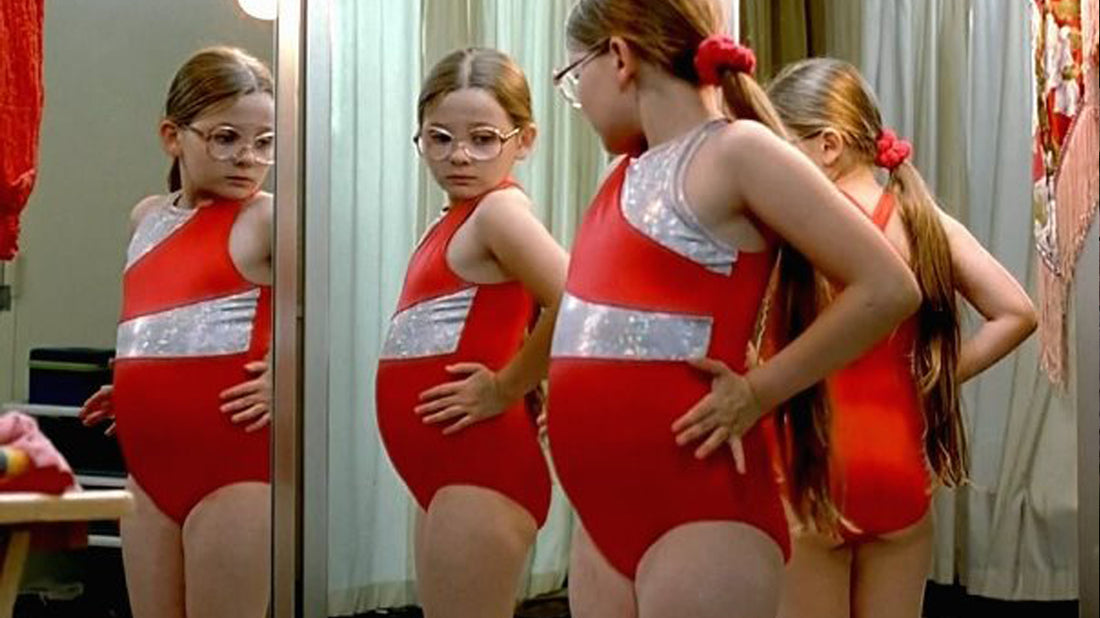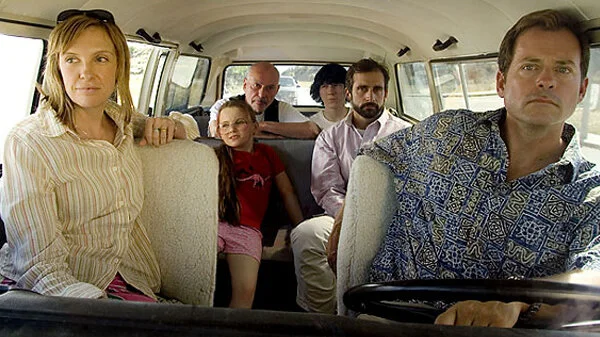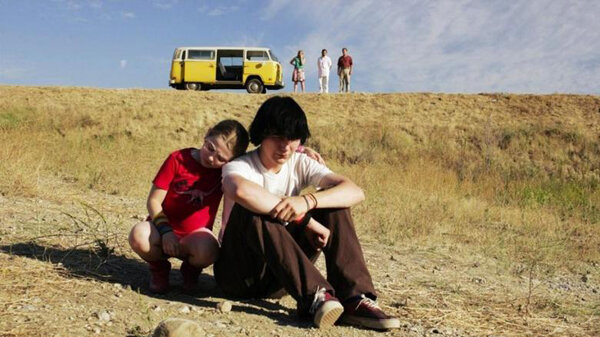A tale of family and failure, Little Miss Sunshine plays on the perspective of the all-American winner. Laura Gabrielle looks back on how Olive's dream of being a beauty queen taught its audience to lose.
The opening of Little Miss Sunshine always puts a lump in my throat. Here stands seven-year-old Olive Hoover watching TV, a hand rested on her round belly, glasses so thick they magnify her eyes. She’s mimicking the actions of the newly crowned Miss America. I got it. Not because I ever wanted to be a beauty queen, but because I too was a child who dreamed.
Released in 2006 to critical acclaim, Little Miss Sunshine follows a family as they venture across Arizona to the Little Miss Sunshine beauty pageant, where daughter Olive is going to compete. Olive does not look like a typical beauty queen, and there’s no mistaking it when the other pageant contestants arrive on screen. Their faces are painted, bodies bronzed, preened to the point of grotesquely morphing into mini-adults. Most of us aren’t used to seeing children like this, I got told off when I was 13 for trying to wear lipstick to school, so the sight of them always makes me laugh and squirm simultaneously. It’s as though the filmmakers are questioning our perception of beauty here, as an audience we want to embrace the imperfections and purities of children, so why not do the same for adults?
The Hoover family embarks on their journey in an old, battered VW camper van. It cracks from the get-go, much like the family's hopes and dreams, which reach their pinnacle of failure just as the van's horn begins blaring and the engine will only start when they're moving rapidly in third gear.
Each character's aspirations seem to be caught up within the alpha American culture that dictates you must be a winner or you’ll never live a fulfilled and prosperous life. Failure is something Dad Richard is against, because he is the ultimate American dreamer. It has consumed his life; he’s selling a nine-step programme to success, but no one is buying. His daughter Olive is even afraid of being a loser because of his constant pep talks and affirmations. Richard is not winning in his role as a father. After all, it's Olive's heroin-snorting but still doting grandfather that consoles her fears, telling her that 'a real loser is someone so afraid of not winning they don't even try.’
Brother Dwayne wants to be a pilot. He reads books by German philosopher Nietzsche, and has taken a vow of silence to focus on his goal. He spends the entire film writing his thoughts on a notepad, and doesn’t even deem it necessary to talk when the family leaves Olive behind at a service station, instead scribbling ‘Where’s Olive?’ on a piece of paper. But we do hear his voice at the end of the film, when he finds out he's colourblind, which means he can never join the Air Force Academy or fly a plane. It's a devastating blow, and just as he loses his dream he breaks his muteness to tell his family that they're all losers too.
Uncle Frank has also failed. We first see him after an unsuccessful suicide attempt, his latest defeat. He's a gay, unemployed Proust scholar. He’s fallen in love with a student who’s in a relationship with Frank’s rival, a rival that has just won a prestigious MacArthur grant. It feels as though the world is falling away from Frank and he only joins the family trip because his sister is afraid to leave him home alone.
Every character in this film fails, including Olive. The first line of the film is Richard standing at a podium saying 'There are two kinds of people in this world, winners and losers.' Screenwriter Michael Arndt was inspired to write the script after reading a quote in a newspaper from Arnold Schwarzenegger telling school students that he despised losers. Arndt said 'I thought, there’s something so wrong with that attitude... something so demeaning and insulting as referring to any other person as a loser... I wanted to attack that idea, that in life you’re either going up or you’re going down... A child beauty pageant is the ultimate in stupid meaningless competition.'
The film offers an antidote to being a loser, just as Grandpa suggested in his advice to Olive - you can lose, as long as you carry on dreaming.
Winning and losing are perceived differently depending on an individual's judgement. Olive doesn't care about anyone else's perception of her – her talent at the pageant is to perform a booty-shaking dance to "Super Freak". The stage school moms in the audience are widely offended, but the Hoover family joins in, and in that moment, Olive starts to win. The family's joy is not wrapped up in the verdict of the competition, defining who is the best-looking or most talented. They're enjoying the moment, their dancing isn’t pretty in the way the pageant sees pretty, but it's beautiful in its own way. It’s expression without self-awareness.
Olive does not win the pageant - this is not one of those Disney tales of an ugly duckling turning into a beautiful princess, she'll probably never be a pageant queen. But in the years before she becomes a teenager, before things such as self-confidence and the desire to look and act like her peers inevitably catch up with her, the audience gets to see her being herself. She is true to her beliefs and her character, which arguably makes her the ultimate winner.
Everyone in the Hoover family eventually emerges victorious. By the end of the film, when Richard has lost his life savings, Frank is still sleeping on his sister’s floor, Dwayne will never become a pilot and Grandpa is dead, they have all failed. But when Olive still has a dream left to hold on to, they start to grasp onto it too. Helping her realise her goal gives them all the chance to feel like they’re winning.
For me, a daydreamer who is often berated for trying to chase seemingly impossible goals or dreams, Dwayne says something I will forever quote from Little Miss Sunshine. Not because I think you should screw over everyone else to get what you want, but because I relate to his brazen attitude that you don’t let someone else tell you ‘no’… 'You do what you love, and fuck the rest.'
Laura Gabrielle (@laurafeasey) is a freelance journalist based in London. She writes on fashion, culture and travel with recent work in the Wall Street Journal, the Metro & Breathe Magazine.
READ ME is a platform for female-led writing on film hosted by Girls on Tops. Louisa Maycock (@louisamaycock) is Commissioning Editor and Ella Kemp (@efekemp) is Contributing Editor.



